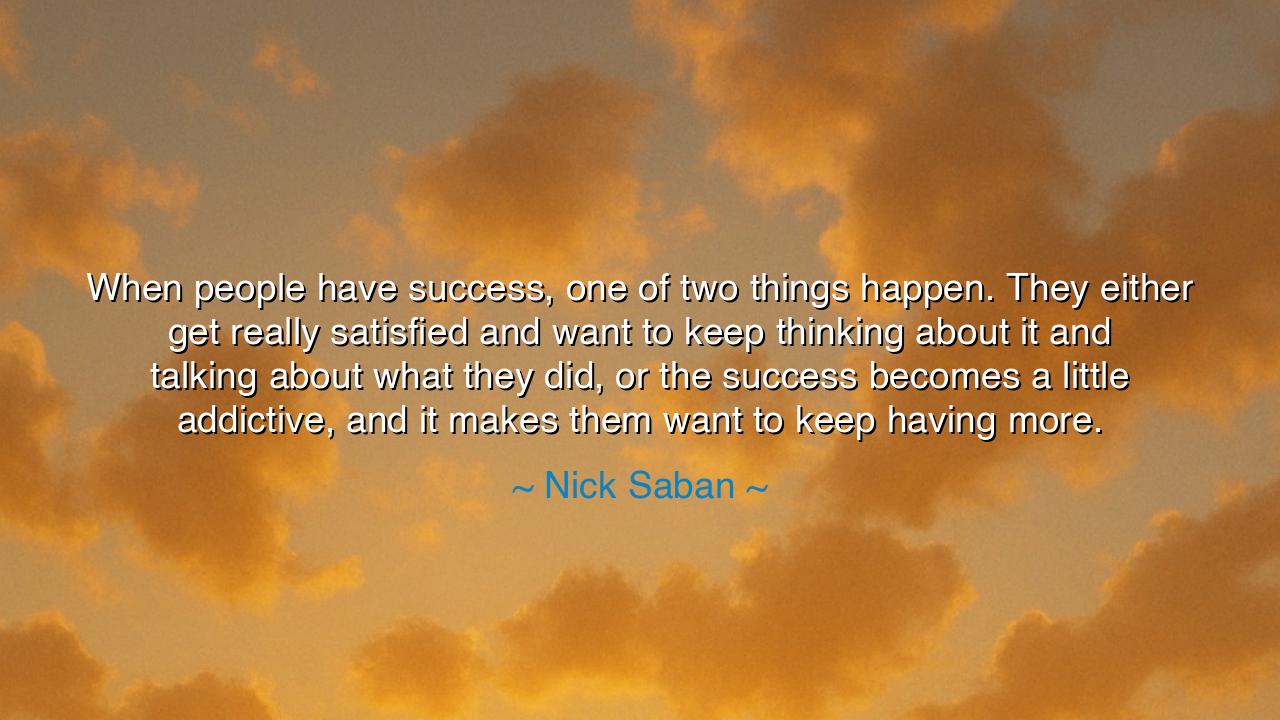
When people have success, one of two things happen. They either
When people have success, one of two things happen. They either get really satisfied and want to keep thinking about it and talking about what they did, or the success becomes a little addictive, and it makes them want to keep having more.






"When people have success, one of two things happen. They either get really satisfied and want to keep thinking about it and talking about what they did, or the success becomes a little addictive, and it makes them want to keep having more." Thus spoke Nick Saban, the master of the gridiron, but his words extend far beyond the stadium. They reveal the two paths that lie before every man and woman when they taste the sweetness of achievement: to rest in the shadow of yesterday, or to hunger for tomorrow’s greater light.
For what is success but a fleeting flame? To some, it is a hearth where they warm themselves forever, telling tales of old victories while the world marches on without them. They live in the memory of what was, satisfied to drink from the same cup until it runs dry. To others, however, success is not an end but a beginning, a spark that ignites the fire of greater striving. These do not dwell on what they have done, but on what they might still accomplish. Thus, success can either be a chain that binds or a wind that carries the soul higher.
The ancients knew this truth well. Alexander the Great, after conquering Persia, did not sit idle in his glory. The flame of addiction to triumph burned within him, driving him to the edges of the known world. Though his body faltered, his spirit refused to rest, and his empire became legend. Yet contrast him with those rulers who, after one victory, grew complacent, feasted in palaces, and were soon overthrown. History remembers not the boastful who stood still, but the relentless who pressed forward.
Consider also the story of Michael Jordan. After winning his first championship, he might have been content to celebrate endlessly, to tell stories of that triumph until the end of his days. But instead, the taste of victory made him hunger for more. It became a sacred fire that consumed doubt and forged discipline. He rose before dawn, trained longer, and demanded greatness from himself and others. In this way, success became not his prison but his engine, propelling him toward immortality in the realm of sport.
Thus, Saban’s words are a warning and a summons. Beware of becoming drunk on your own achievements, for they can lull you into stillness and stagnation. But also beware of blind addiction, for it can devour balance and leave you hollow. The wise take the middle path: they let success inspire them to greater effort, while keeping their eyes fixed not on vanity but on purpose. Satisfaction must not become slumber, and addiction must not become madness.
The lesson, then, is clear: treat success as a seed, not a throne. Let each victory be the soil from which new effort grows. Celebrate, yes, but do not dwell too long at the banquet of yesterday. Instead, rise again, sharpen your tools, and face the dawn as though you have yet to prove yourself. For the world is ever-changing, and only those who continue the climb find the higher peaks.
Practical wisdom teaches this: after each achievement, ask yourself, What next? How can this serve as a foundation for more? Do not merely recount what you have done; envision what you can still do. Strive not for glory alone, but for growth, for mastery, for the shaping of your destiny. In this way, success will not bind you, but will instead summon forth the very best of who you are.
Therefore, children of tomorrow, remember this teaching of Nick Saban: success is not the final crown but the first spark. Let it not lull you into silence, nor consume you with vanity, but let it be the steady fire that lights your path toward ever-greater purpose. Walk onward, for the journey of greatness never truly ends.






AAdministratorAdministrator
Welcome, honored guests. Please leave a comment, we will respond soon